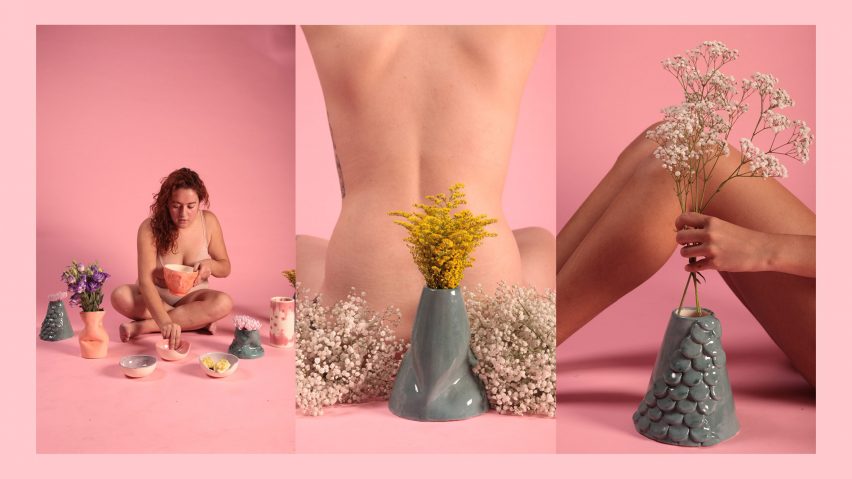
Ten student design projects from Centro de Diseño y Comunicación
Dezeen School Shows: an installation that "acts and thinks" and an ornate fashion collection made from featherwork, foiling and embroidery are included in Dezeen's latest school show by students at Centro de Diseño y Comunicación.
Also included is a series of ceramics that take cues from the female form and a smart training suit designed to enhance physical performance.
Centro de Diseño y Comunicación
Institution: Centro de Diseño y Comunicación
School: Centro de diseño, cine y televisión
Courses: BA Architecture, BA Film and Television, BA Industrial Design, BA Interior Architecture, BA Marketing and Strategic Design, BA Creative Computing, BA Textile and Fashion Design and BA Visual Communication
Tutors: Miquel Adrià, Roberto Cabezas, Guillermo Huerta, Uzyel Karp, Cecilia León de la Barra, Beata Nowicka, Cristina Piña and Miguel Torres
School statement:
"Centro is an urban model for higher education in design, architecture, digital media and film in Mexico City.
"Since its founding in 2004, it has become Mexico's main institution for higher learning in the field of creativity, providing its 2,500 students with the unique opportunity to transform their passion and talent into successful, cutting-edge professional careers.
"Centro focuses on the critical role of creativity in analysing and resolving problems of varied complexity in diverse contexts, using a human-centred and system-oriented approach.
"Centro creates creative experts with a socially conscious, sustainable and entrepreneurial perspectives through a specialised and personalised educational model.
"It offers undergraduate and graduate degree programs to future generations of creative leaders in Mexico and beyond.
"We are focused on creativity because we believe it is the key element to thrive in today's complex world and its intricate dynamic systems."
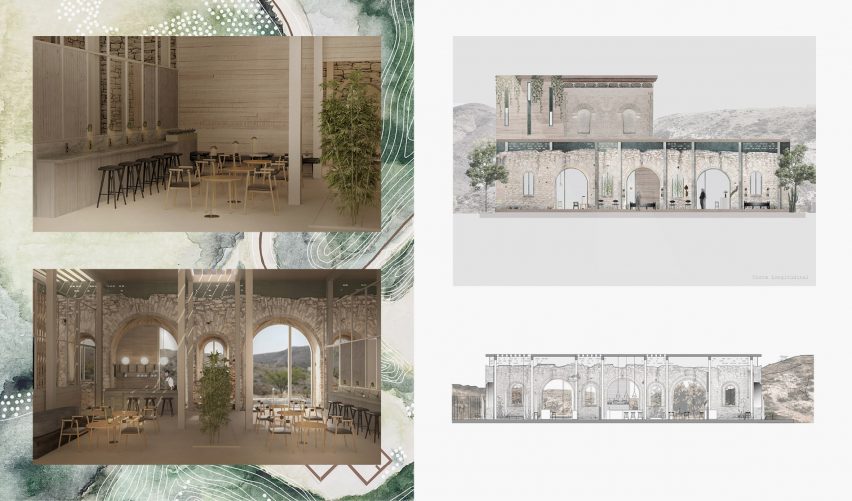
Capas: A thesis on the rehabilitation of forgotten architecture by Regina Lauxterman Munguía
"Capas is a mixed-use scheme that explores the ways in which pre-existing fragments of architecture can coexist with contemporary design interventions.
"The project focuses on the joins between old and new, and giving continuity to existing buildings by integrating new materials and architectural elements that will make the space habitable again without damaging or modifying the layers of its history.
"The space resignifies and reactivates life inside a forgotten structure."
Student: Regina Lauxterman Munguía
Email: rlauxterman[at]centro.edu.mx
Course: BA Interior Architecture
Tutors: Alexander Cziharz, Aldo Juarez Meave and Eduardo Duarte Muñoz
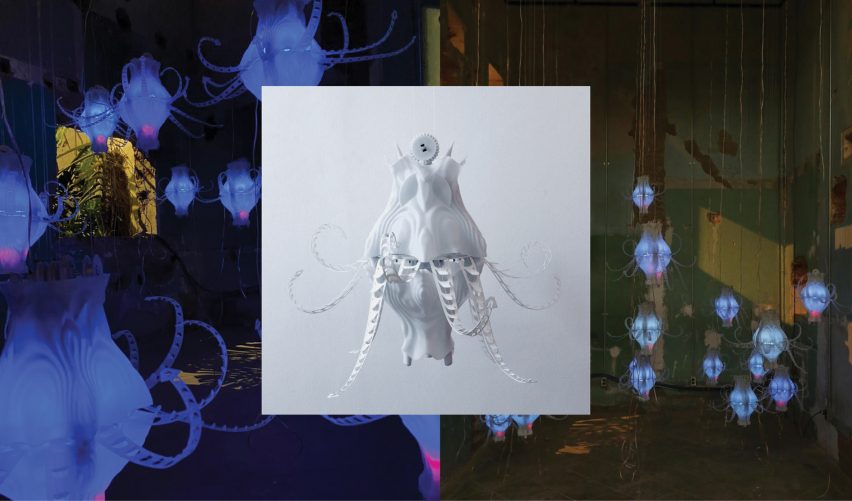
Machina Vitae by Constantino Brito Grek
"Machina Vitae is an installation that acts and thinks – it imitates biological mechanisms through gears and pulleys and can feel, react and communicate through sensors and circuits.
"Each synthetic organism has all the necessary components to operate independently – it can move and perceive the environment on its own.
"However, its true potential unfolds when this module is iterated as these organisms are capable of communicating with each other through touch, light and colour.
"With a few of these pieces interacting, a collective intelligence is formed, they are no longer individual modules, they are a coordinated superorganism.
"The superorganism is composed of machines that are not inanimate objects nor are they alive – they are a thinking collective composed of agents that in an individual scale perform simple actions, but these iterated actions form a complex system."
Student: Constantino Brito Grek
Email: cbrito[at]centro.edu.mx
Course: BA Creative Computing
Tutors: Ana Rosa Gómez Mutio, Fernanda del Monte, Diego Trujillo Pisanty, Beto Olsi, Rolando González and Roberto Cabezas
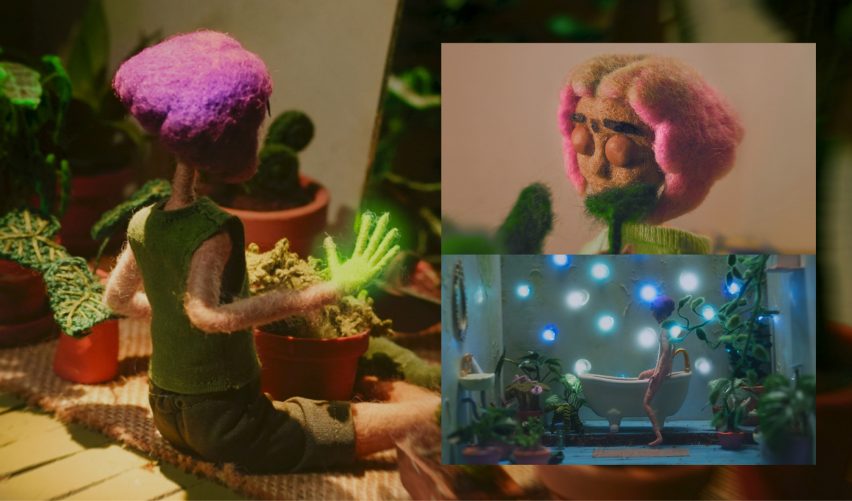
Shortfilm: Las plantas también mueren by Andrea León
"Inside a room full of plants, a woman finds shelter from the outside world. Submerged in delirium, Alba experiences her withering.
"This short film uses the stop-motion technique in which the illusion of bringing an inanimate object to life is created through a series of photographs.
"The uniqueness of the frame-by-frame animated output; the imperfections that reveal the presence of the human hand is its greatest charm. This technique references childhood games.
"Las plantas también mueren is a tribute to Mother Nature and the cyclical and essential processes of life – the inevitable transformation over time, growth, death and rebirth."
Student: Andrea León
Email: aleong[at]centro.edu.mx
Course: BA Film and Television
Tutors: Ángeles Sánchez, Jorge Gardoni, Cristina Piña and Ricardo Cortés
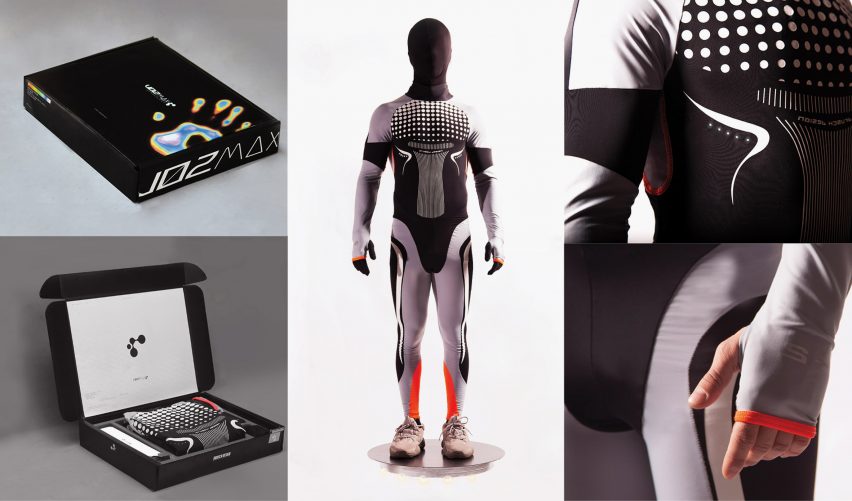
V02-MAX a smart training suit by David Schoenfeld
"VO2-MAX is a smart training suit that allows to control physiological responses with the aim of improving performance and endurance, alerting and evaluating the strengths and weaknesses of the athlete.
"Constant monitoring, such as performance control tests that diagnose the precise information of training in terms of techniques and physical qualities using wearable technology, allow the athlete's status to be controlled.
"This monitoring prevents alterations in the wearer's stimuli, such as injuries, overheating, poor hydration, recovery control and other adverse effects related to the exchange of ambient temperature with the thermoregulatory system.
"E-Textile makes it work – VO2-MAX is a completely wearable suit that can be washed without damaging the capacities and alterations of all electronic components.
Student: David Schoenfeld
Email: dschoenfeld[at]centro.edu.mx
Course: BA Industrial Design
Tutors: Diego Trujillo Pisanty, Andrea Izquierdo Ruiz and Eduardo Duarte Munoz
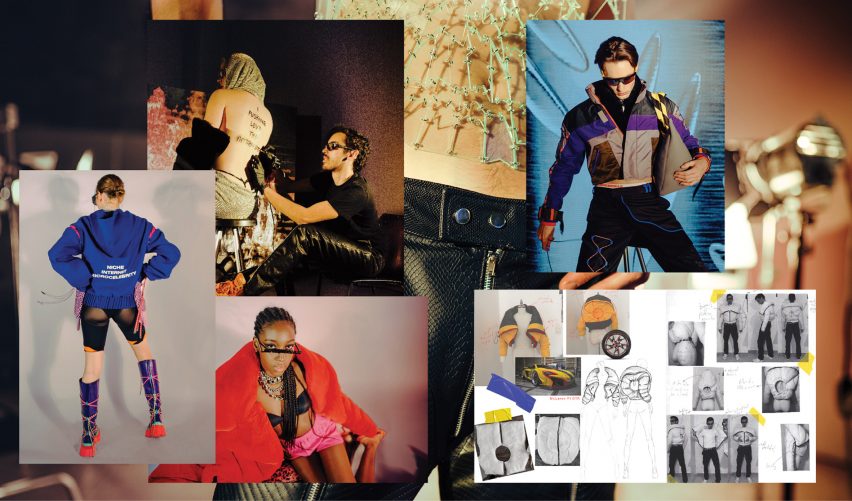
Ifuckinglovetheinternet by Jero Rosas
"Ifuckinglovetheinternet explores the question of what fame means in the digital age.
"Using digital tools such as programming and collaboration with artificial intelligence, the collection poses a new idea of what streetwear means for internet users.
"Pulling from references such as sports cars, status symbols and the absurdity of flex-culture, the collection reinterprets luxury and exclusivity through irony.
"The concept of memes, ego and social networks become pillars to generate a collection driven by details that revolve around the user, taking their experience to a new level.
"The virtual realm has been responsible for transforming the concept of fame into something that seems accessible for everyone at the reach of a click."
Student: Jero Rosas
Email: jrosas[at]centro.edu.mx
Course: BA Textile and Fashion Design
Tutors: Judith Almazán, María Ponce, Andrea Bores, Fernando Madrid, Luciana Renner and Guillermo Huerta
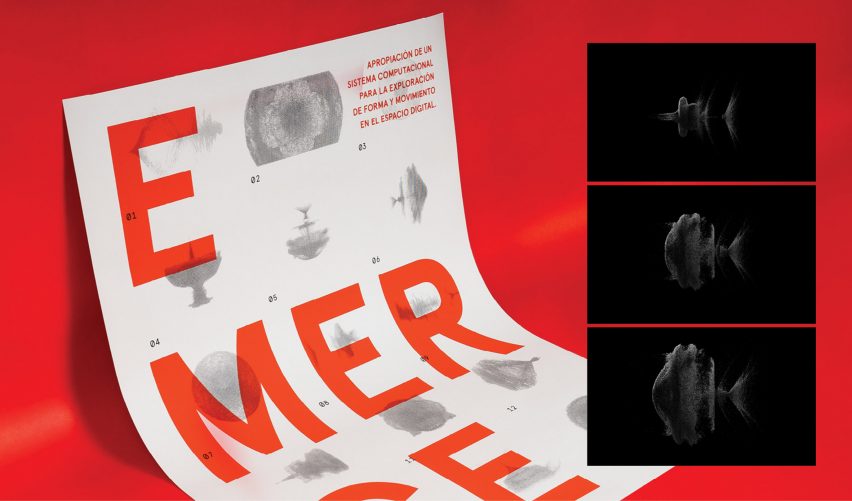
Emerge by Daniela Levy Esses
"Emerge is a project of research and practice that asks questions about how computational systems contribute to the artistic process of simulation, to explore form and movement within digital space.
"The experimental animation has aesthetic aims and derives from the appropriation of a computational system known as Boids.
"Experiments emerge through the parameterization of variables declaring the possibility of form and movement in digital space, and parting from a logic perceived in the natural world, which is then translated into computational science."
Student: Daniela Levy Esses
Email: dalevye[at]centro.edu.mx
Course: BA Creative Computing
Tutors: Ana Rosa Gómez Mutio, Fernanda del Monte, Diego Trujillo Pisanty, Rolando González, Aaron Martínez and Roberto Cabezas
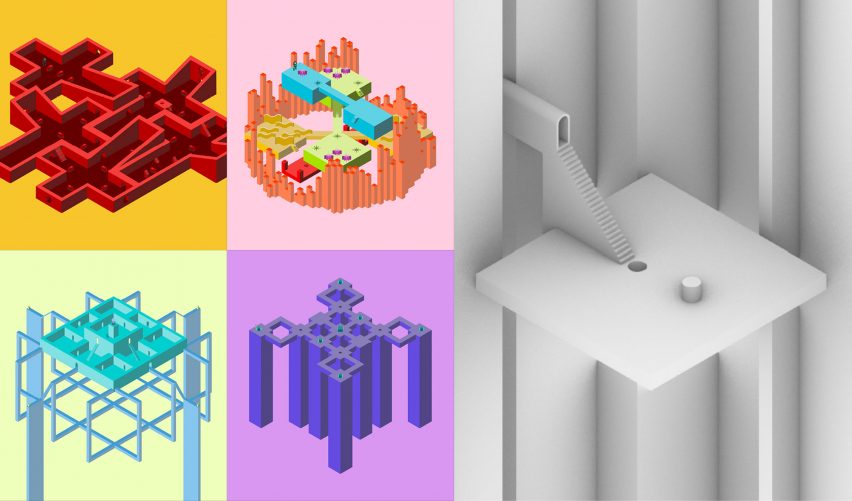
Architecture/Atmosphere + Videogames (AV) by Regina Rios Gurría
"My work aims to explore the limits of interior architecture from the perspective of a video game.
"This research seeks to analyse the interior architectural atmospheres of the video game Monument Valley created by UsTwo Games.
"The aim is to understand the set of elements that make up a moving and exciting atmosphere by identifying key visual constants: colour, shape, movement, lighting, landscape, background and thematic setting etc.
"The notion of space is analysed through the lenses of virtual reality, interior design, illustration and games.
"As a result of the joint application of these four perspectives, a more comprehensive understanding of the nature of interior design emerged – one increasingly less tethered to the physical world and more firmly planted in the new possibilities of the digital realm."
Student: Regina Rios Gurría
Course: BA Interior Architecture
Tutor: Alexander Cziharz
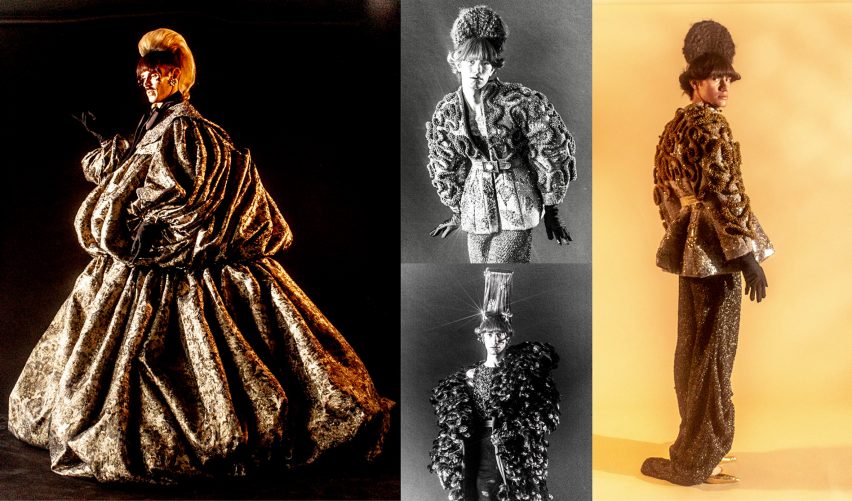
The Primadonna Manifesto by Guillermo de Jesús
"The Primadonna Manifesto is a collection that is inspired by a new subculture of people that I call 'Primadonnas'. They seem to live in a performance in which they imitate a classic, eccentric and glamorous archetype of a woman, commonly referred to in Mexican culture as a 'lady'.
"The Mexican telenovela and cinema divas, interior decoration and the Marianist aesthetic were keys to discover the characteristics that the Primadonnas and are reflected in their personality.
"The obsession for ornate, ostentatious and antique features are some of the points that I used to create the manifesto, which guided me to build the aesthetic universe of the Primadonna.
"Artisanal techniques such as featherwork and textile methods such as embroidery, foiling and dyeing were used throughout the garment creation process."
Student: Guillermo de Jesús
Email: gsolis[at]centro.edu.mx
Course: BA Textile and Fashion Design
Tutors: Judith Almazán, María Ponce, Andrea Bores, Fernando Madrid, Luciana Renner and Guillermo Huerta
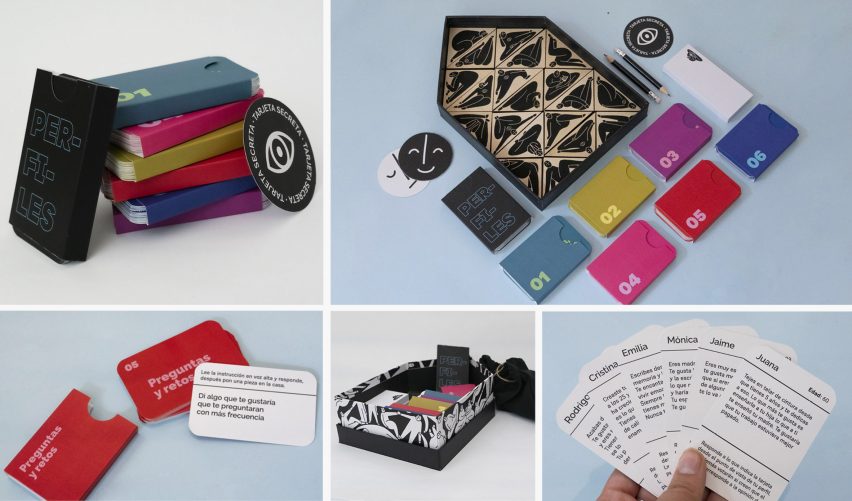
Habitemos: Conversación, amor y juego como herramientas de transformación social by Daniela Zorrilla Valdés
"Habitemos is a board game in which there are no winners or losers – participants have a common goal that can only be achieved through collaboration.
"Through the different cards and dynamics, it seeks to generate spaces that encourage ideological diversity.
"The design of the game comes from the analysis of the dynamics of conversations that are violent normalised.
"For example, those in which the goal is to be right and change the opinion of others, or the dynamics of power and hierarchies, interruptions and poor listening skills, to name a few.
"These conversations, besieged by the values of patriarchal capitalism, generate a cycle of communication that does not allow us to discuss alternative ways of life therefore hindering our development as a society.
"The ultimate goal of Habitemos is to gradually transform the way we converse in order to make change in this harmful cycle of communication, and transform it into a cycle that embraces differences and confronts conflict without getting into intolerant dynamics.
"Let's learn to converse from love and have fun while we do it."
Student: Daniela Zorrilla Valdés
Email: dzorrillav[at]centro.edu.mx
Course: BA Visual Communication
Tutors: Regina Olivares Alberti, Carlos Nicolés Pradilla Molina and Cristina Cruz Hernández
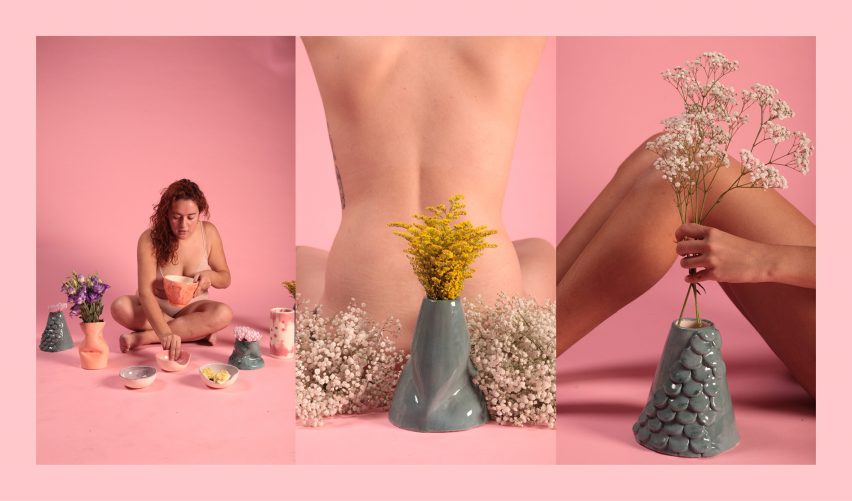
Cuerpa by Adelaida Cortés
"Have you ever asked yourself about which parts of your thoughts, behaviours and emotions come from the collective intellectual unconscious to which we are exposed every day?
"Do you like your body when you look in the mirror? Spanish is a language that has grammatical gender – it means that inanimate objects have a pronoun or article.
"We are used to assuming that every noun that ends in the letter 'O' is a male gender, even when talking about nouns that can be neutral or both.
"When we mention 'Cuerpo' it means the human body, and we think about a masculine subject. I made 'Cuerpa' to materialise and give power and identity to the stories of the Mexican women's bodies."
Student: Adelaida Cortés
Email: adelaidacortesb[at]gmail.com
Course: BA Industrial Design
Tutor: Eduardo Duarte
Partnership content
This school show is a partnership between Dezeen and Centro de Diseño y Comunicación. Find out more about Dezeen partnership content here.